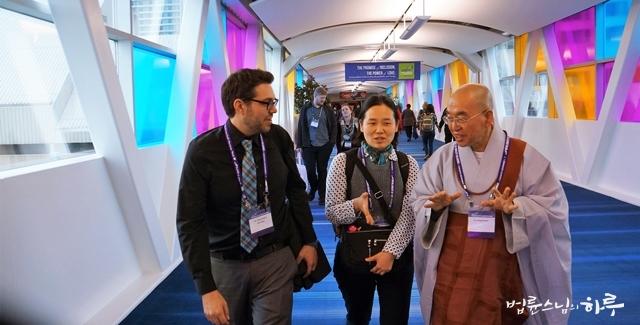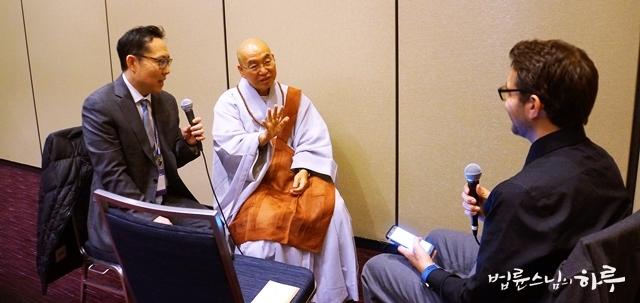
A: “We are with Ven.Pomnyun Sunim, a Korean Buddhist monk, and a Zen master renowned for his humanitarian efforts around the world. He is the founder of a number of non-profit organizations and recipient of the Magsaysay Award, which is internationally recognized as Asia’s Nobel Prize counterpart, so very prestigious, very wonderful guest. Thank you for being here with us. My first question is what inspired you to forego the stereotypical monastic life of seclusion and quiet contemplation for a life of activism focused on addressing the world’s most critical problems.”
P: “We meditate to live happy lives. Although individuals’ mindsets and spiritual practices are necessary for happiness, society must also be more peaceful and just for people to be happy. Therefore, social movement is also a goal of practice.”
A: “Thank you. In your mind, what unique insights does Buddhism offer for responding to environmental degradation and global systems of exploitation and overconsumption?”
P: “We human beings cannot exist by ourselves on Earth. Since we coexist with the natural environment, animals, and plants, destroying the natural environment is equal to destroying the foundation of our lives. The Buddha taught us that although we have to use nature to survive, we should consume the resources at the minimum so that nature is preserved and we can continue to coexist. I believe that Buddha’s teachings are very valuable in preserving nature.

The foremost teaching of the Buddha is the Law of Dependent Origination, which states that nature and humans do not exist separately but coexist in relation to each other. We don’t think that the destruction of nature will affect our lives because we believe that nature and humans exist separately, but in fact we are interconnected. Rather than having the perspective of simply needing to protect nature, we need to have the perspective of ‘Nature is a part of my body and my life, so its destruction will lead to the end of my own life’ in order to fundamentally solve the environmental issues.”
A: “Wonderful. Thank you. That’s perfect. Given everything you have just said about the teachings of the Buddha, the insights of dependent arising and codependent origination, the interconnectedness of all things, the idea that we are constituted by our relationships that we are not separate from nature but part of nature, how do you see the global ecological crisis as interconnected with your effort to promote human rights and world peace?”
P: “On a global scale, the most serious issue is the mistaken concept that humans can advance civilization by conquering nature. Nature is not the object of conquest but the foundation of our lives. In this sense, the environmental issue is the biggest problem we need to solve.
Second, when we look at mankind, poverty is the biggest issue. The problem of the poor does not exist separately from that of the rich. Since the resources available to us are limited, if we waste them, it will undoubtedly threaten the right of the people on the other side of the world to maintain their lives. Abolishing poverty is not merely a problem of individual people but one that all of mankind must solve together.
Third, peace is another serious issue. Because people tend to think egocentrically, they consider that those with different views are wrong. We must acknowledge that every one of us has different beliefs and thoughts. The path to peace is to acknowledge and understand the differences. If we fail to acknowledge the differences and continue to hold the viewpoint of ‘I am right and you are wrong,’ we cannot avoid conflicts.
In the realm of nature, you can find dogs big and small and of different colors like black, white, or yellow. In nature, animals do not discriminate against other animals based on fur color, breed, or sex. However, humans often discriminate against others based on skin color and gender. This goes against the order of nature. From this perspective, acknowledging differences is the most important prerequisite for peace.
Let’s examine the peace of a person’s mind. If we can see the truth of things, that things are simply different from one another, and that everything is interconnected, the torment in our mind disappears. However, if we view things as right or wrong, see everything as separate rather than interconnected, and fail to see things as they really are, the feeling of anguish will arise in our minds. Thus, it is not important whether we meditate or use different methods to seek peace of mind. The purpose of meditation is to see the truth, to see things as they are, without succumbing to emotions. Then, we can finally be at peace.
Protecting the environment, eradicating poverty, creating peace, and ensuring gender equality are not separate issues. I view them as one problem in our lives. In this sense, I am not seeking to engage in many issues, but I am involved in many issues because they are all part of one issue.”
A: ” Thank you. I know that at the Parliament of World Religions, there has been a lot of talk about oneness and coming together, and what I hear you saying is that oneness should not be sameness and that inclusion should not erase diversity. I really value that. That we can come together, but our differences are important, and we can have unity but not uniformity. There is a sort of unity in difference and complementarity of difference as opposed to contradictions. I think that is what I am hearing, and I think that it is a beautiful and important message that can lead to peace and sustainability.”
P: “As a matter of fact, nature is the same. Look at your hand. All five fingers look different but they are all connected to one hand. Even though the fingers are part of one hand, they are not the same. Therefore oneness and diversity coexist. It’s extremely dangerous when oneness is driven to uniformity, but we must also see that diversity is not the same as being separate entities. When we look at an object as a whole, it can be considered as one entity, but on a specific level, all things are different from one another.”
A: “Given that, what are some of the biggest challenges that we face in trying to achieve peace, harmony, and sustainability on a global scale?”
P: “One is greed and the other is self-righteousness. In terms of greed, I think consumerism, the notion that the more you consume the better off you are, is the most serious problem. The view that increasing consumption equates to development will ultimately bring about the destruction of our environment and conflict over natural resources. Secondly, insisting that only one’s own faith, thoughts, and culture are right causes conflicts and wars. Sometimes these two issues go hand in hand. Religion should teach people to respect diversity by overcoming self-righteousness and to live frugally by rejecting consumerism, but religion is doing the opposite. In fact, different religions encourage consumerism by telling their followers they can get anything they wish for, and each of the religions reinforces obstinacy by teaching its followers that only its belief is right. Instead of providing help, religion has become an obstacle to human civilization.”
A: “I am tempted to ask you how we can fix that among religions, but perhaps we can save that for another time. But I will ask you what may be an equally complicated question. So among your published works, you talk about themes like prayer, wisdom, freedom, and happiness. What roles do you think these themes have in creating a more harmonious, peaceful, and sustainable world? My add-on question is what is the key to happiness and freedom.”
P: “We feel happy when our wishes are granted and think that freedom is doing whatever we want to do. Such happiness and freedom ultimately restrict us and cause suffering. Becoming liberated from greed and desire is true happiness, and becoming free of what we want is true freedom. Therefore, true happiness and freedom should begin with ourselves. When we are freer from our desires, we can tackle the problems in the world. I am not saying that we should suppress our desires. Although everyone has desires, we should become free from them. When we follow our desires, we will collide with other people’s desires and create conflict. On the other hand, when we suppress our desires, we get stressed. Neither following nor suppressing desires is the solution. Only when we become aware that we have desires can we find the path to becoming free from them? This is the core goal of meditation.”
A: “Thank you. That’s good. We are running low on time. Thank you for giving us so much time already. And I will wrap up with one question. In a world of turmoil that is filled with systemic injustice and suffering, what gives you hope?”
P: “The world has always been like that since the dawn of time. The world hasn’t become suddenly complicated. It seems complicated because we are not able to understand the present world since we are looking at it through the lens of the past. Therefore, we first need to be able to see how the world is changing. Also, we should know that justice is not absolute. When we define justice in a certain way, we will end up punishing others based on that criterion. There is no fixed definition of justice. Does that mean that we can act however we want? No. We need to make a choice in the context of time, space, and condition. A relative definition of justice exists within that context.
When people ask if they should wear their clothes or take them off when getting a shower, the answer is that they should take them off. It is right under the given condition. Therefore, justice should be defined based on the course of nature as much as possible. In the past, the definition of justice was centered around humans, males, white people, Christianity, and adults. However, this approach caused many adverse side effects. Thus, now, we should also consider nature, females, people of color, other religions, and minors in establishing a new definition of justice.
This is because we now perceive a more expanded world. We’re witnessing the destruction of environments. Women and people of color are demanding equality. Also, we are witnessing resistance from religious groups and the youth. Therefore, we should accommodate their opinions and create a new definition of justice. However, the new definition of justice won’t be absolute either. If the environment and conditions change, justice will have to be defined again. The concepts of ethics, morals, and justice from the past need to be newly defined according to the changed circumstances.
I believe that we should have two viewpoints. First, although we used to believe that the world is a collection of individual entities, we must now be able to perceive that all beings are interconnected like a net. Second, although we have thought that we are all the same, we now have to acknowledge that we are a little bit different from one another and respect one another. I believe that today’s concept of social justice should be redefined based on these two viewpoints.”
A: “I would say a better world for all of us to live together. Thank you very much, Ven. Pomnyun for joining us and for your hard work in saving sentient beings and the world which are core features of this emerging ecological civilization we are striving for. Thank you, Jason. You are an amazing interpreter. Thank you for being here as well.”
© 2024 Jungto Society - All Rights Reserved


